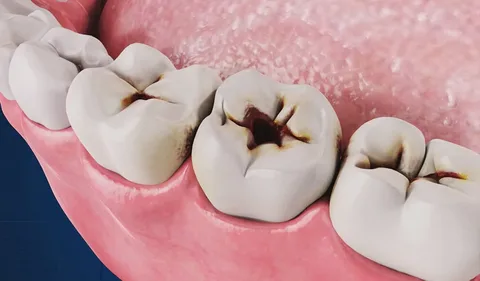Introduction to Sugar and Oral Health
Sugar, in its various forms such as sucrose, glucose, and fructose, is a type of carbohydrate commonly consumed in the diet. While sugar provides energy for the body, its frequent consumption, particularly in the form of sugary snacks, beverages, and candies, can have adverse effects on oral health. The relationship between sugar and cavities is well-established, with excessive sugar consumption being a significant risk factor for tooth decay.
Understanding Tooth Decay and Cavities
Tooth decay, also known as dental caries, occurs when bacteria in the mouth metabolize sugars from food and produce acids that erode tooth enamel. Over time, this process can lead to the formation of cavities, which are small holes or openings in the teeth. Cavities can vary in size and severity, ranging from minor surface decay to deep lesions that affect the inner layers of the tooth.
How Sugar Contributes to Cavities
The process of cavity formation involves several steps, with sugar playing a central role:
Repeated exposure to sugar and acidic conditions accelerates the progression of tooth decay, leading to the development of cavities and potential complications such as tooth sensitivity, pain, and infection.
Sugar Consumption:
When sugary foods and beverages are consumed, the sugars they contain come into contact with the teeth.
Bacterial Metabolism:
Bacteria naturally present in the mouth, particularly Streptococcus mutans, feed on the sugars and produce acids as byproducts.
Acid Production:
The acids produced by bacteria lower the pH level in the mouth, creating an acidic environment that demineralizes tooth enamel.
Enamel Erosion
Over time, the acidic environment weakens tooth enamel, causing it to lose minerals and become softer.
Cavity Formation
As enamel continues to demineralize, small openings or lesions, known as cavities, may form on the surface of the tooth.
Effects of Sugar on Oral Health
In addition to cavity formation, excessive sugar consumption can have other detrimental effects on oral health:
Gum Disease
Sugar promotes the growth of harmful bacteria in the mouth, increasing the risk of gum disease (gingivitis and periodontitis).
Tooth Erosion
Acidic foods and beverages containing sugar can erode tooth enamel, leading to increased sensitivity and susceptibility to cavities.
Dental Plaque
Sugary foods and drinks contribute to the formation of dental plaque, a sticky film of bacteria that adheres to the teeth and gums, further promoting tooth decay and gum disease.
Preventive Measures Against Tooth Decay
While sugar is a primary contributor to cavities, there are several preventive measures individuals can take to protect their oral health:
Limit Sugar Consumption
Reduce the intake of sugary foods and beverages, particularly between meals, to minimize exposure to cavity-causing sugars.
Practice Good Oral Hygiene
Brush teeth at least twice a day with fluoride toothpaste, floss daily, and use antimicrobial mouthwash to remove plaque and bacteria from the mouth.
Regular Dental Checkups:
Schedule regular dental exams and cleanings to monitor oral health, detect cavities early, and receive professional dental care as needed.
Fluoride Treatment
Use fluoride-containing dental products such as toothpaste and mouthwash to strengthen tooth enamel and prevent cavities.
Healthy Diet
Consume a balanced diet rich in nutrient-dense foods such as fruits, vegetables, dairy products, and lean proteins to support overall oral and systemic health.
FAQs (Frequently Asked Questions)
How does sugar specifically contribute to cavity formation?
Sugar serves as a food source for bacteria in the mouth, leading to the production of acids that erode tooth enamel and promote cavity formation over time.
Are all sugars equally harmful to teeth?
While all sugars can contribute to cavity formation, sticky or slow-dissolving sugars found in candies, sodas, and sweet snacks pose a higher risk due to prolonged exposure to the teeth.
Can sugar-free or diet products still cause cavities?
Sugar-free or diet products may contain artificial sweeteners that do not contribute to cavities directly. However, acidic ingredients in these products can still erode tooth enamel and increase the risk of cavities if consumed frequently.
How often should I brush and floss to prevent cavities?
It is recommended to brush teeth at least twice a day and floss daily to remove plaque and bacteria from the mouth and prevent cavity formation.
Can cavities be reversed or healed naturally?
Early-stage cavities, known as demineralization or enamel erosion, may be reversible with proper oral hygiene and fluoride treatment. However, advanced cavities that have progressed to tooth decay typically require professional dental intervention, such as fillings or dental crowns.
Are there any natural remedies for preventing cavities?
While good oral hygiene practices are the most effective way to prevent cavities, some natural remedies such as oil pulling with coconut oil or using herbal mouthwashes may help support oral health. However, these remedies should not replace traditional dental care and preventive measures.
Can children develop cavities from consuming sugary foods and drinks?
Yes, children are particularly susceptible to cavities due to their developing teeth and dietary habits. Limiting sugar intake, promoting good oral hygiene, and regular dental checkups are essential for preventing cavities in children.
Conclusion
In conclusion, sugar plays a significant role in the development of cavities and tooth decay by promoting the growth of cavity-causing bacteria and creating acidic conditions in the mouth. Excessive sugar consumption, particularly from sugary snacks, candies, and beverages, can lead to the erosion of tooth enamel, cavity formation, and other oral health complications. By practicing good oral hygiene, limiting sugar intake, and receiving regular dental care, individuals can protect their teeth and gums from the harmful effects of sugar and maintain optimal oral health throughout their lives. Remember that prevention is key, and taking proactive steps to minimize sugar exposure and maintain good oral hygiene habits can help preserve your smile for years to come.
- Retinol Peel For Oily Skin In Kingston Upon Thames - May 31, 2025
- Profhilo Treatment Near Esher, Surrey - May 30, 2025
- Redensity 1 Skin Booster Treatments Near Tatsfield, Surrey - May 30, 2025

